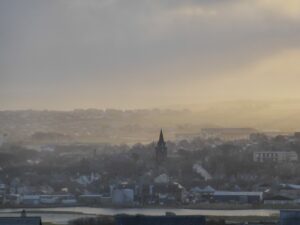
Thinking about photographs has prompted me to think about sight. I prefer to take landscape views rather than close up shots. And I think I tend to be better at noticing the grand scale of things rather than what is by my feet. I have certainly felt that my long distance sight has improved since moving out of the town. My horizon now extends for a good 25 miles on a clear day, rather than just across the street. It has made me notice more.
I wonder whether living in towns has encouraged us to develop a different type of vision? So much that we now do is small scale, even driving a car rarely requires us to look far ahead. And, of course, we focus on screens – when I was a child you were told not to sit too close to the television; today we think nothing of working a foot or so away from our computer screens. Our lives require good, close sight.
Those who came across hunter-gatherer groups in the nineteenth century often commented on the amazing long sight of their contacts. It was something noted by Lucas Bridges in his wonderful account of life in Tierra del Fuego at the end of the nineteenth century: The Uttermost Part of the Earth, but he was not alone; I have come across it elsewhere. It is usually described as part of the skills of the hunter, but of course it also serves other purposes: the ability to forsee danger; or the recognition of way markers along an obscure (to us) routeway.
In 2009 a study concluded that men have better distance vision due to their hunter-gatherer past, whereas women are more adept at observing close range, reflecting the skills required of the gatherer (Stancey, H. & Turner, M. 2010). It is not just a matter of vision; it is also to do with how your brain processes space.
I can’t comment on the study, but it is a reminder just how much we have changed, or not, since our hunter-gatherer past. Our circumstances do help to shape the senses we need and the way we are. Over time, I guess, the effect is cumulative. I doubt that many of us (outside the profession of deer stalking) retain the vision to spot an animal at a distance that would allow us to approach it downwind and get close enough to shoot it with bow and arrow. Or even, perhaps, the vision to spot possible prey at closer range. I remember a trip out with a rabbit hunter once and he saw the bunnies long before I had noticed them.
Meanwhile, I do enjoy the way my eyes have (re)adjusted to distance since moving north. Curiously, I find it much more restful to contemplate the broad sweep of landscape rather than the detail. I’d like to think that I’m tuning in to my hunter-gatherer ancestors, but I suspect it is something more prosaic.
You must be logged in to post a comment.